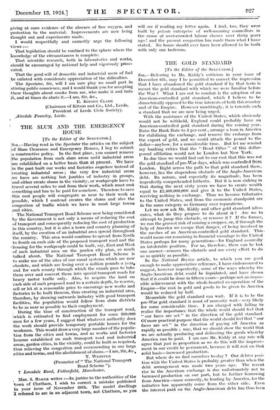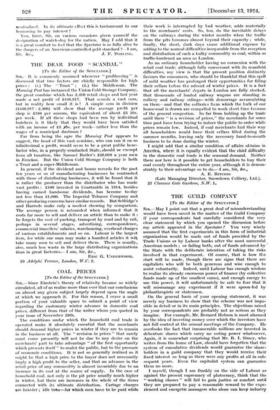THE GOLD STANDARD [To the Editor of the SrEcr_vron.] Sin,—Referring
to Mr. Kiddy's criticism in your issue of December Gth, may I be permitted to correct the impression that I have abandoned the gold standard if by that term is meant the gold standard with which we were familiar before the .War ? What I am out to combat is the adoption of an American-controlled gold standard, which I believe to be diametrically opposed to the true interests of both this country and of the Empire. However unwittingly, it is towards such a standard that we are now being urged.
With the assistance of the United States, which obviously would not be withheld, England could probably have an American-controlled gold standard during the coming year. Raise the Bank Rate to 5 per cent., arrange a loan in America for stabilizing the exchange, and remove the embargo from the export of gold, and we could attach the pound to the dollar—anyhow, for a considerable time. But let me remind my banking critics that the " Head Office " of this dollar- pound affiliation would not be London but New York.
In due time we would find out to our cost that this was not the gold standard of pre-War days, which was controlled from London. Right across the path to that gold standard there, however, lies the stupendous obstacle of the Anglo-American debt. Its nature, and especially its magnitude, has been imperfectly comprehended hitherto. But it is now sinking in that during the next sixty years we have to create wealth equal to £2,400,000,000 and give it to the United States, receiving nothing in exchange. Thus we become tributaries to the United States, and from the economic standpoint are in the same category as Germany over reparations.
Let we now ask Mr. Kiddy and other gold standard advo- cates, what do they propose to do about it ? Are we to attempt to jump this obstacle, or remove it ? If the former, we run the gravest risk of coming a cropper, or, if through the help of America we escape that danger, of being involved in the meshes of an American-controlled gold standard. This . would mean our remaining in financial vassalage to the United States perhaps for many generations—for England assuredly an intolerable position. For us, therefore, there can be but one answer—remove the obstacle and use every effort to do so as quickly as possible.
In the National Review article, to which you are good enough to make appreciative reference, I have endeavoured to suggest, however imperfectly, some of the ways whereby the
Anglo-American debt could be liquidated, and have shown that if it could be done in fifteen years—perhaps not an impos- sible achievement with the whole-hearted co-operation of the Empire—the cost in gold and goods to be given to America would be reduced by half.
Meanwhile the gold standard can wait. If it is to be the pre-War gold standard it must of necessity wait—very likely for some considerable time. I am charged with failing to realise the importance that the whole world should feel that " our faces are set " in the direction of the gold standard- Of more practical purpose that the world should feel that " our faces are set " in the direction of paying off America as rapidly as possible ; nay, that we should show the world that
we are actually producing and delivering the goods whereby America can be paid. I am sure Mr. Kiddy at any rate will agree that just in proportion as we do this will the improve- ment in our credit be permanent, because it will rest on that solid basis—increased production.
But where do we find ourselves to-day ? Our debtor posi-
tion with the United States is probably greater than when the debt arrangement was made two years ago. The recent rise in the American exchange is due unfortunately not to increased production on our part, but to further borrowing from America—more correctly, to lending by America, for the initiative has apparently come from the other side. Even the interest paid on the Anglo-American debt has thus been
neutralized. In its ultimate effect this is tantamount to our borrowing to pay interest !
You, have, Sir, on various occasions given yourself the designation of watch-dog for the nation. May I add that it is a great comfort to feel that the Spectator is so fully alive to the dangers of an American-controlled gold standard ?—I am,



























































 Previous page
Previous page